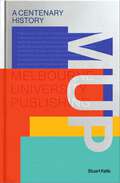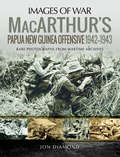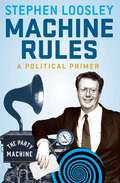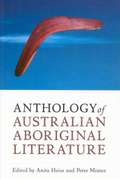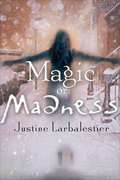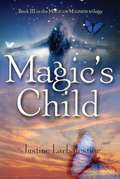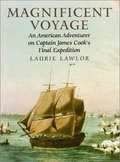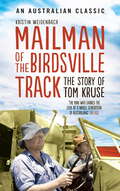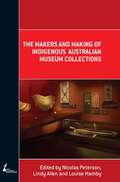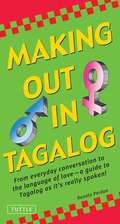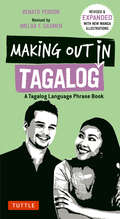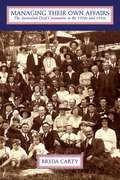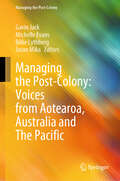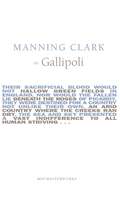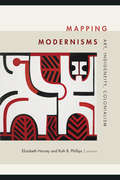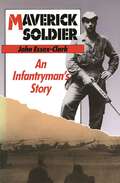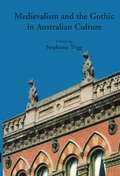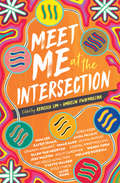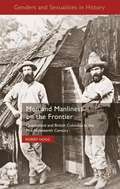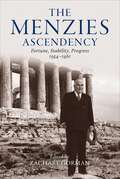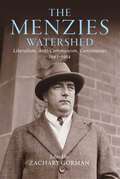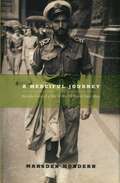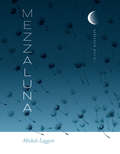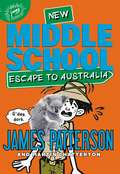- Table View
- List View
MUP: A Centenary History
by Stuart KellsAustralia's oldest university press is also one of our best known and most trusted publishers. Founded in 1921 as a bookshop for students at the University of Melbourne, Melbourne University Press was soon publishing important works that contained the best of national scholarship. Landmark MUP books and series include The Australian Dictionary of Biography, Manning Clark's History of Australia, The Encyclopaedia of New Guinea and the journal Meanjin. These and other MUP publications helped shape how Australians perceived themselves, and how they talked about literature, politics, race, the Pacific, the world wars and public policy. From its inception, MUP grappled with hard questions. How should a university press be governed? To what extent should such a press be concerned with political, polemical and radical works? And can a university press be financially self-sustaining if it focuses on books that commercial publishers overlook? The respective leaders of MUP answered these questions in ways that regularly led the press into controversy. Using a century of MUP publications and archives, Stuart Kells has written a rich and fascinating history of an invaluable Australian institution-one that is widely seen as public property, and whose ups and downs have always been news.
MacArthur's Papua New Guinea Offensive, 1942–1943 (Images of War)
by Jon Diamond Dr.&“A compelling chronicle of the Battle of Papua New Guinea with rarely viewed images from World War II . . . an excellent book.&” —Naval Historical Foundation The Japanese seizure of Rabaul on New Britain in January 1942 directly threatened Northern Australia and, as a result, General Douglas MacArthur took command of the Southwest Pacific Area. In July 1942, the Japanese attacked south across the Owen Stanley mountain range. Thanks to the hasty deployment of Australian militiamen and veteran Imperial Force troops the Japanese were halted at Ioribaiwa Ridge just 27 miles from Port Moresby. MacArthur&’s priority was to regain Northeast New Guinea and New Britain. The capture of airfields at Buna and reoccupation of Gona and Sanananda Point were prerequisites. The Allied offensive opened on 16 November 1942 with Australian infantrymen and light tanks alongside the US 32nd Infantry Division. Overcoming the Japanese and the inhospitable terrain in tropical conditions proved the toughest of challenges. It remains an achievement of the highest order that the campaign ended successfully on 22 January 1943. This account with its clear text and superb imagery is a worthy tribute to those who fought and, all too often, died there.&“Covers a seriously neglected key campaign of WWII. Most Highly Recommended.&” —Firetrench&“A fascinating look at real jungle warfare and the images only accentuate how miserable troops must have been during the fighting.&” —ModelingMadness.com
Machine Rules: A political primer
by Stephen LoosleyBut does a powerbroker like Stephen Loosley ever leave the political word? In his candid memoir, Loosley writes about defending the indefensible, the best way to start and kill off rumours, the value of truth in campaigning, how to use humour to squash a scandal, the key to fundraising and why bullshit always comes back to smother you.
Macquarie Pen Anthology of Aboriginal Literature
by Anita Heiss Peter MinterA groundbreaking collection of work from some of the great Australian Aboriginal writers, the MACQUARIE PEN ANTHOLOGY OF ABORIGINAL LITERATURE offers a rich panorama of over 200 years of Aboriginal culture, history and life. From Bennelong's 1796 letter to contemporary creative writers, Anita Heiss and Peter Minter have selected work that represents the range and depth of Aboriginal writing in English. The anthology includes journalism, petitions and political letters from both the nineteenth and twentieth centuries, as well as major works that reflect the blossoming of Aboriginal poetry, prose and drama from the mid-twentieth century onwards. Literature has been used as a powerful political tool by Aboriginal people in a political system which renders them largely voiceless. These works chronicle the ongoing suffering of dispossession, but also the resilience of Aboriginal people across the country, and the hope and joy in their lives. With some of the best, most distinctive writing produced in Australia, this anthology is invaluable for anyone interested in Aboriginal writing and culture.
Magic or Madness (Magic or Madness, Book #1)
by Justine LarbalestierReason has lived fifteen years in the Australian outback with her mother, Sarafina, They're on the run from Reason's grandmother Esmeralda, who believes in magic and practices horrifying dark rituals. But when Sarafina suffers a mental breakdown, Reason is sent to the one place she fears most--'Esmeralda's home in Sydney. Nothing about the house or Esmeralda is what Reason expected. For the first time she finds herself questioning her mother's teachings. Then, when she walks through Esmeralda's back door in Sydney and finds herself on a New York City street, Reason is forced to face the shocking truth. magic is real. And Reason is magic. The first book in Justine Larbalestier's thrilling trilogy brings readers from one country to another and through revelation upon revelation, leading to Reason's ultimate discovery of the price she must pay for the magic that lives in her blood.
Magic's Child (Magic or Madness #3)
by Justine LarbalestierIn the third installment in the Magic or Madness trilogy, the people Reason Cansino loves most are all in danger. Reason’s mother, Sarafina, has disappeared from the mental hospital in Sydney with Reason’s evil grandfather, Jason Blake. Jay-Tee, the closest thing Reason has to a best friend, has used all of her magic and faces death at any moment. Only Reason can find the answers within her family’s magic to save everyone who matters most to her.
Magnificent Voyage: An American Adventurer on Captain James Cook's Final Expedition
by Laurie LawlorWhen Captain James Cook set off on his third and final voyage in 1776, a crew of intrepid and perhaps naive men sailed with him, including a twenty-five-year-old American named John Ledyard. This riveting account based on Ledyard's journal brings dramatic events of that historic voyage to life, including the discovery of the Hawaiian Islands by Europeans, and the desperate attempts to find the Northwest Passage along the treacherous Alaskan coast. Maps, time line, biographies of the expedition's crew members, source notes, and index are included.
Mailman of the Birdsville Track: The story of Tom Kruse
by Kristin WeidenbachThe truly classic Australian story of Tom Kruse - legendary mailman of the Birdsville Track.For the people who lived in the desert between Marree and Birdsville, contact with the outside world was hard and sporadic - but one man was their lifeline: Tom Kruse. For more than twenty years he was the connection with the outside world for the families, station workers and others who lived along the Birdsville Track.Tom delivered everything from the mail and newspapers to fuel and food - whole communities waited in anticipation for him to drop off their supplies. But it was a hard life, from regularly making running repairs to his truck to unloading and reloading tons of stores so that he could ferry his cargo across flooded creeks. Come sandhills, hell or high water, Tom Kruse kept faith with the locals up and down the Track.Tom was a real Australian hero - and no matter what happened, the mail always got through.'Told with honesty and vigour' - Sydney Morning Herald'A tribute to a man who earned the love of a whole generation of Australians and shows us that the pioneer characteristics of guts and good-natured stoicism are still beautiful' - The Age'Full of characters' - Daily Telegraph
Mailman of the Birdsville Track: The story of Tom Kruse
by Kristin WeidenbachThe truly classic Australian story of Tom Kruse - legendary mailman of the Birdsville Track.For the people who lived in the desert between Marree and Birdsville, contact with the outside world was hard and sporadic - but one man was their lifeline: Tom Kruse. For more than twenty years he was the connection with the outside world for the families, station workers and others who lived along the Birdsville Track.Tom delivered everything from the mail and newspapers to fuel and food - whole communities waited in anticipation for him to drop off their supplies. But it was a hard life, from regularly making running repairs to his truck to unloading and reloading tons of stores so that he could ferry his cargo across flooded creeks. Come sandhills, hell or high water, Tom Kruse kept faith with the locals up and down the Track.Tom was a real Australian hero - and no matter what happened, the mail always got through.'Told with honesty and vigour' - Sydney Morning Herald'A tribute to a man who earned the love of a whole generation of Australians and shows us that the pioneer characteristics of guts and good-natured stoicism are still beautiful' - The Age'Full of characters' - Daily Telegraph
Makers and Making Of Indigenous Australian Museum Collections
by Nicolas Peterson Lindy Allen Louise HambyThis volume of original essays brings together, for the first time, histories of the making and of the makers of most of the major Indigenous Australian museum collections. These collections are a principal source of information on how Aboriginal people lived in the past. Knowing the context in which any collection was created; the intellectual frameworks within which the collectors were working, their collecting practices, what they failed to collect, and what Aboriginal people withheld; is vital to understanding how any collection relates to the Aboriginal society from which it was derived. Once made, collections have had mixed fates: some have become the jewel of a museum's holdings, while others have been divided and dispersed across the world, or retained but neglected. The essays in this volume raise issues about representation, institutional policies, the periodisation of collecting, intellectual history, material culture studies, Aboriginal culture and the idea of a 'collection'.
Making Out in Tagalog: (Tagalog Phrasebook)
by Renato PerdonMaking Out in Tagalog is a fun, accessible and thorough Tagalog phase book and guide to the Filipino language as it's really spoken.<P><P>If you are a student, businessman or tourist traveling to the Philippines and would like to have an authentic and meaningful experience, the key is being able to speak like a local. This friendly and easy-to-use Tagalog phrasebook makes this possible. Making Out in Tagalog has been carefully designed to act as a guide to modern colloquial Tagalog for use in everyday informal interactions-giving access to the sort of catchy Filipino expressions that aren't covered in traditional language materials. Each expression is given in Tagalog, so that in the case of difficulties the book can be shown to the person the user is trying to communicate with.This Tagalog phrasebook includes:A guide to pronouncing Tagalog words correctly including vowel combinations and stressing of wordsExplanations of basic Tagalog grammar, such as, word order, pronouns, borrowed words, and polite vs. impolite tensesUseful and interesting notes on Tagalog language and Filipino cultureLots of colorful, fun and useful expressions not covered in other phrasebooks
Making Out in Tagalog: A Tagalog Language Phrase Book
by Renato Perdon Imelda F. GasmenMaking Out in Tagalog is your indispensable guide to contemporary Tagalog language (Filipino) as it's really spoken on the streets of Manila.This best-selling Tagalog phrase book is the perfect introduction to everyday interactions in The Philippines and other Tagalog-speaking countries, and includes colorful slang that'll help rev up your social life. A great way to learn Tagalog, Making Out in Tagalog features a pronunciation guide, and notes on Tagalog language and culture. With Making Out in Tagalog you'll be able to express yourself when: Making new friends Sharing a meal Going out on the town Flirting and getting amorous And much more!Each expression in this book is given in Tagalog and their English translations. It is designed to enhance your experience in using the language (and in a pinch, you can show the Tagalog text to the person you're speaking to). Making Out in Tagalog also includes interesting tips on social norms and cultural practices, eating, social media, hanging out, and other situations. For the savvy traveler, this is a Tagalog phrasebook you won't want to be without!
Managing Their Own Affairs: The Australian Deaf Community In The 1920s And 1930s
by Breda CartyManaging Their Own Affairs explores how Deaf organizations and institutions were forged in Australia during the early 20th century. During this period, deaf people challenged the authority of the dominant welfare organizations, or Deaf Societies, which were largely controlled by hearing people and run as charitable institutions. Breda Carty comprehensively documents the growth of the Australian Deaf community and Australian Deaf organizations for the first time. She focuses on both the political developments of the early 20th century and on the nature of the relationships between deaf and hearing people. During this time, deaf Australians aspired to manage their own affairs. They enjoyed some success by establishing “breakaways” from the Deaf Societies, and they also established an independent national organization, which was contested and ultimately suppressed by the Deaf Societies. These developments were influenced by wider social movements in Australian society, such as the mobilization of minority groups in their push for autonomy and equal rights. Although most of the breakaway Deaf organizations did not survive beyond the 1930s, they significantly affected the power structures and relationships between deaf and hearing people in Australia. The Australian Deaf community’s attempts to organize independently during these years have been largely erased from collective memory, making Carty’s examination a particularly important and necessary addition to the historical literature.
Managing the Post-Colony: Voices from Aotearoa, Australia and The Pacific (Managing the Post-Colony)
by Gavin Jack Michelle Evans Billie Lythberg Jason MikaThis edited book is the second in the book series “Managing the Post-Colony”. The book series is co-edited by Nimruji Jammulamadaka (IIM Calcutta, India) and Gavin Jack (Monash University, Australia). The book series seeks to present cutting-edge, critical, interdisciplinary, and geographically and culturally diverse perspectives on the contemporary nature, experience, and theorisation of managing and organising under conditions of postcoloniality. This book specifically presents voices and perspectives from Aotearoa New Zealand, Australia, and The Pacific, locations with shared and distinctive histories and present-day experiences of colonisation and imperialism. Ways of managing, organising, and doing business in these places demonstrate cultural continuity and change in such histories, present sites of postcolonial struggle, and diverse prospects for self-determined future-making. The book explores struggles and prospects of managing in the post-colony through qualitative empirical cases, historical and legal studies, conceptual essays and provocations, and interviews with Indigenous business leaders. It contributes to the ongoing diversification, provincialisation, and decolonisation of management and organisation studies and practice. A strong focus is placed on diverse Indigenous knowledges and experiences, including those of Aboriginal and Torres Strait Islander, Pasifika, and Māori peoples, and insights into the capacity for Indigenous culture-specific modes of business to offer decolonising futures.
Manning Clark On Gallipoli
by Manning ClarkManning Clark's History of Australia has been nominated as the most influential work of non-fiction Australia has produced. As Donald Horne wrote, Clark 'looked for great human issues and presented them as moral dramas'. In this extract from Volume 5, the tragedy of Gallipoli is played out against the broader Australian experience of World War I, as the nation, still in its infancy, struggled to make sense of the terrible conflict in Europe and its costs. Manning Clark On Gallipoli is the first title in the MUP Masterworks series, which celebrates distinguished Australian writers and ideas. This title's release coincides with the ninetieth anniversary commemorations of the landing at Gallipoli.
Mapping Modernisms: Art, Indigeneity, Colonialism (Objects/Histories)
by Ruth B. Phillips Elizabeth HarneyMapping Modernisms brings together scholars working around the world to address the modern arts produced by indigenous and colonized artists. Expanding the contours of modernity and its visual products, the contributors illustrate how these artists engaged with ideas of Primitivism through visual forms and philosophical ideas. Although often overlooked in the literature on global modernisms, artists, artworks, and art patrons moved within and across national and imperial borders, carrying, appropriating, or translating objects, images, and ideas. These itineraries made up the dense networks of modern life, contributing to the crafting of modern subjectivities and of local, transnationally inflected modernisms. Addressing the silence on indigeneity in established narratives of modernism, the contributors decenter art history's traditional Western orientation and prompt a re-evaluation of canonical understandings of twentieth-century art history. Mapping Modernisms is the first book in Modernist Exchanges, a multivolume project dedicated to rewriting the history of modernism and modernist art to include artists, theorists, art forms, and movements from around the world. Contributors. Bill Anthes, Peter Brunt, Karen Duffek, Erin Haney, Elizabeth Harney, Heather Igloliorte, Sandra Klopper, Ian McLean, Anitra Nettleton, Chika Okeke-Agulu, Ruth B. Phillips, W. Jackson Rushing III, Damian Skinner, Nicholas Thomas, Norman Vorano
Maverick Soldier: An Infantryman's Story
by John Essex-ClarkMaverick Soldier is the forthright, nuts-and-bolts account of John Essex-Clark's unmatched experience as a warrior, leader and teacher. Its telling is all of a piece with the man himself—bluff, astute, no-nonsense. In the course of stumbling, as he puts it, from the rank of private to brigadier, Essex-Clark has fought in wars with the Australian, British, United States and Rhodesian armies, and has led in battle Malay, South African, Rhodesian, Vietnamese, British, New Zealand, United States and Australian soldiers. In peacetime came tours of duty in North America and Western Europe. Nicknamed 'Digger' by the Rhodesian Army and 'The Big E' in the Australian, he led by force of personality, drive, common sense and self-confidence. Military readers and armchair witnesses to war will be challenged by his trenchant and timely views on army obsession with technology and the paucity of subtle tactical thinking. Various controversies are aired: whether we were 'pussyfooters' in Vietnam; bastardization at Duntroon; how best to conduct counter-terrorism. He is angered by what he sees as a 'surfeit of military dilettantes and budding bureaucrats and a dearth of warrior-chiefs'. Always one to lead from the front and to trust the courage and good sense of the ordinary infantryman, his interests have been strategy and battle tactics, leadership and training. He writes particularly for today's young soldier whom he loves with an old fashioned generosity, and to whom he can declare with conviction, 'I have no angst about being a soldier'.
Medievalism And The Gothic In Australian Culture
by Stephanie TriggThis collection opens up a new field of academic and general interest: Australian medievalism. That is, the heritage and continuing influence of medieval and gothic themes, ideas and cultural practices. Geographically removed from Europe, and distinguished by its eighteenth-century colonial settlement, Australia is a fascinating testing-ground on which to explore the cultural residues of medieval and gothic tradition. These traditions take a distinctive form, once they have been 'transported' to a different topographical setting, and a cultural context whose relationship with Europe has always been dynamic and troubled. Early colonists attempted to make the unfamiliar landscape of Australia familiar by inscribing it with European traditions: since then, a diverse range of responses and attitudes to the medieval and gothic past have been played out in Australian culture, from traditional forms of historical reconstruction through to playful postmodernist pastiche. These essays examine the early narratives of Australian 'discovery' and the settlement of what was perceived as a hostile, gothic environment; exercises of medieval revivalism and association consonant with the British nineteenth-century rediscovery of chivalric ideals and aesthetic, spiritual and architectural practices and models; the conscious invocation and interrogation of medieval and gothic tropes in Australian fiction and poetry, including children's literature; the transformation of those tropes in fantasy, role-playing games and subcultural groups; and finally, the implication of the medieval past for discussions of Australian nationalism.
Meet Me at the Intersection
by Ambelin Kwaymullina Rebecca LimMeet Me at the Intersection is an anthology of short fiction, memoir andpoetry by authors who are First Nations, People of Colour, LGBTIQA+ orliving with disability. The focus of the anthology is on Australian life asseen through each author's unique, and seldom heard, perspective.With works by Ellen van Neerven, Graham Akhurst, Kyle Lynch, EzekielKwaymullina, Olivia Muscat, Mimi Lee, Jessica Walton, Kelly Gardiner,Rafeif Ismail, Yvette Walker, Amra Pajalic, Melanie Rodriga, Omar Sakr,Wendy Chen, Jordi Kerr, Rebecca Lim, Michelle Aung Thin and AlicePung, this anthology is designed to challenge the dominant, homogenousstory of privilege and power that rarely admits ‘outsider' voices.
Men and Manliness on the Frontier
by Robert HoggIn mid-nineteenth-century Britain, there existed a dominant discourse on what it meant to be a man -denoted by the term 'manliness'. Based on the sociological work of R. W. Connell and others who argue that gender is performative, Robert Hogg asks how British men performed manliness on the colonial frontiers of Queensland and British Columbia.
Menzies Ascendency: Fortune, Stability, Progress 1954–1961
by Zachary GormanWas Menzies's unprecedented electoral success merely a matter of luck, or did he make fortune bend to his will? On 30 November 1954, Robert Menzies became Australia's longest serving prime minister. Between the closely fought 1954 and 1961 elections, the Coalition enjoyed a political dominance that allowed it to reshape the nation. The period saw the creation of the Reserve Bank of Australia, the signing of the landmark Commerce Agreement with Japan, vast investment in Australia's universities, the development of Canberra, the opening of Australia's first nuclear reactor, forgotten but transformative healthcare reforms, the abolition of the dictation test, forward progress on Indigenous policy, the signing of an enduring Antarctic Treaty, and more. Yet to critics this was a time when the opportunity for reform was wasted. Has Menzies's deliberate emphasis on continuity over change obscured his achievements? Is consolidated progress preferable to policy revolution? And what does the Australian public want from its leaders? All these issues are explored in the third of a four-volume history of Menzies and his world, based on conferences convened by the Robert Menzies Institute at the University of Melbourne. Contributors include Robert Bowker, Andrew Bragg, Paul Brown, Elizabeth Buchanan, Selwyn Cornish, Damien Freeman, David Furse-Roberts, Anne Henderson, Paul Kelly, Sean Jacobs, David Lee, Ted Ling, Lyndon Megarrity, Greg Melleuish, Andrew Norton, Michael de Percy, Paul Strangio and Stephen Wilks.
Menzies Watershed: Liberalism, Anti-communism, Continuities 1943–1954
by Zachary GormanThe eleven years that passed between the 1943 and the 1954 elections were arguably some of the most pivotal in Australian history. This was a period of intense political, policy and strategic transition, which saw a popular Labor Government and its state-led vision for post-war reconstruction toppled by Robert Menzies and his newly formed political machine, the Liberal Party of Australia. Meanwhile, a backdrop of rising Cold War tensions came to dominate domestic and international policymaking, ushering in a divisive communist party ban, the ANZUS treaty, the Colombo Plan, and Australia's own agency of international espionage, ASIS. But what was the difference in practical terms between Menzies and his predecessors? What role was the state to play under a centre-right government, and would Menzies be able to live up to the liberal ideals with which he had won over the Australian public? All these issues are explored in the second of a four-volume history of Menzies and his world, based on conferences convened by the Robert Menzies Institute at the University of Melbourne. Contributors include Christopher Beer, Andrew Blyth, Troy Bramston, Lorraine Finlay, Nicolle Flint, David Furse-Roberts, Anne Henderson, David Lee, Lucas McLennan, Lyndon Megarrity, Charles Richardson, William Stoltz and Tom Switzer.
Merciful Journey
by Marsden HordernIn 1939 Marsden Hordern's mother refused to sign the paper allowing her seventeen-year-old son to fight overseas with the Royal Australian Air Force. 'I did not rear you to be killed in an aeroplane,' she said. 'Join the navy.' He took her advice and in doing so determined his future. In small patrol boats, Fairmiles and a Harbour Defence Motor Launch, he patrolled the shores of Japanese-held territory, assisted beleaguered commandos in Timor, and was finally caught up in the drama of collecting Japanese prisoners of war from the islands. A Merciful Journey presents a vivid and compelling account of Hordern's life from a happy childhood growing up in Sydney during the Great Depression, to his years serving in the Royal Australian Navy from 1942 to 1947. Drawing on the letters and journals he wrote at the time, Hordern engagingly recounts his triumphs and disasters as a naval officer, detailing his rise from a young and callow sub-lieutenant to a lieutenant in command of his own ship. He recalls his hopes and fears, and, in the face of the horrors of war, reveals an appealing enthusiasm for new experiences and a growing love of the sea. A Merciful Journey is a delightful memoir of a young man's coming of age in wartime.
Mezzaluna: Selected Poems (Wesleyan Poetry Series)
by Michele LeggottMezzaluna gathers work from Michele Leggott's nine books of poetry. As reviewer David Eggleton writes: "Leggott shows us that the ordinary is full of marvels which... stitched, flow together into sequences and episodes that in turn form an ongoing serial, or bricolage: a single poem, then, rejecting exactness, literalism, naturalism in favor of resonance, currents, patterns of ebb and flow." In complex lyrics, sampling thought and song, voice and vision, Leggott creates lush textured soundscapes. Her poetry covers a wide range of topics rich in details of her New Zealand life, full of history and family, lights and mirrors, the real and the surreal. She focuses on appearance and disappearance as modes of memory, familial until we lose sight of that horizon line and must settle instead for a series of intersecting arcs. Leggott writes with tenderness and courage about the paradoxes of losing her sight and remaking the world in words.on white you fallinto lineher voice fillsthe groundpotato cuts the sundries paints the deck printsshapes shadows of oranges green 'cyan and magenta' sail your picnicsea into the eye land crimson lemons hand methe moonrisen rode rose ridewhite out to see
Middle School: Escape to Australia (Middle School #9)
by James Patterson Martin Chatterton Daniel GriffoIn the newest installment of James Patterson's bestselling Middle School series, everyone's favorite underdog hero Rafe Khatchadorian is headed to the dangerous wilds of Australia! Rafe isn't exactly considered a winner in Hills Village Middle School to say the least, but everything's about to change: he's won a school-wide art competition, and the fabulous prize is getting to jet-set off to Australia for a whirlwind adventure! But Rafe soon finds that living in the Land Down Under is harder than he could've ever imagined--his host-siblings are anything but welcoming, the burning temperatures are torturous, and poisonous critters are ready to sting or eat him at every step. So with the help of some new misfit friends, Rafe sets out to show everyone what he does best: create utter mayhem!
